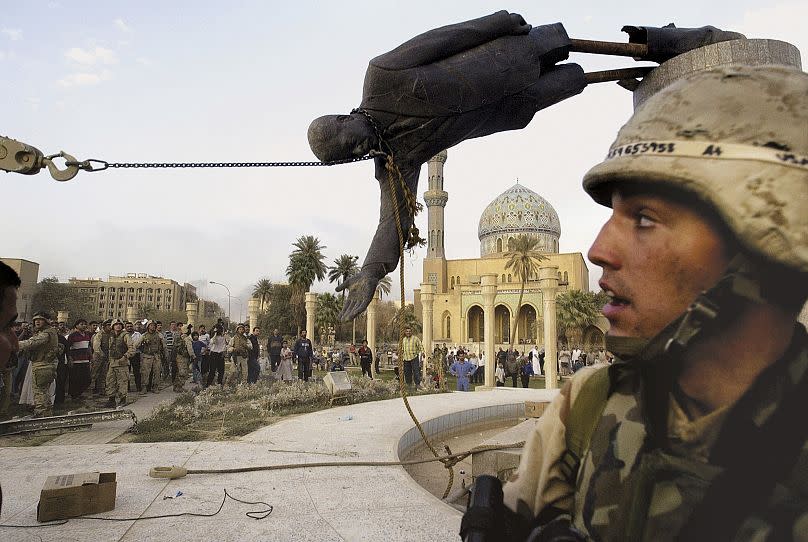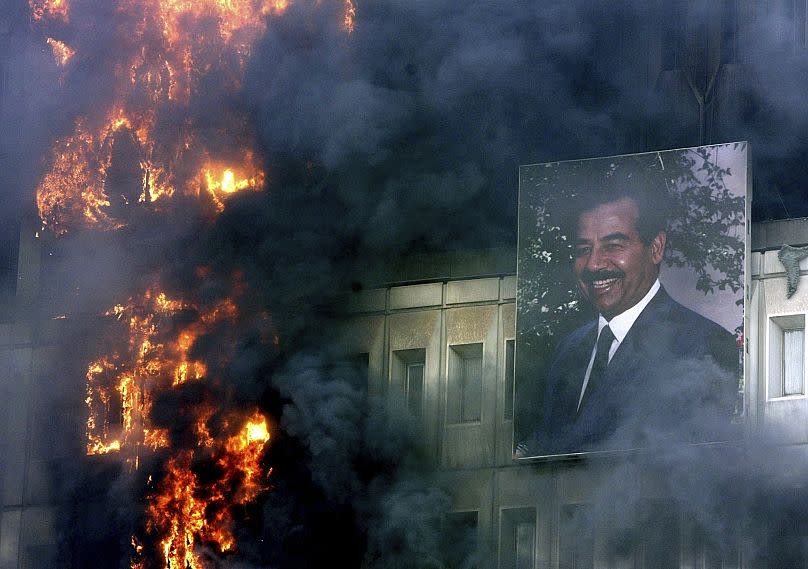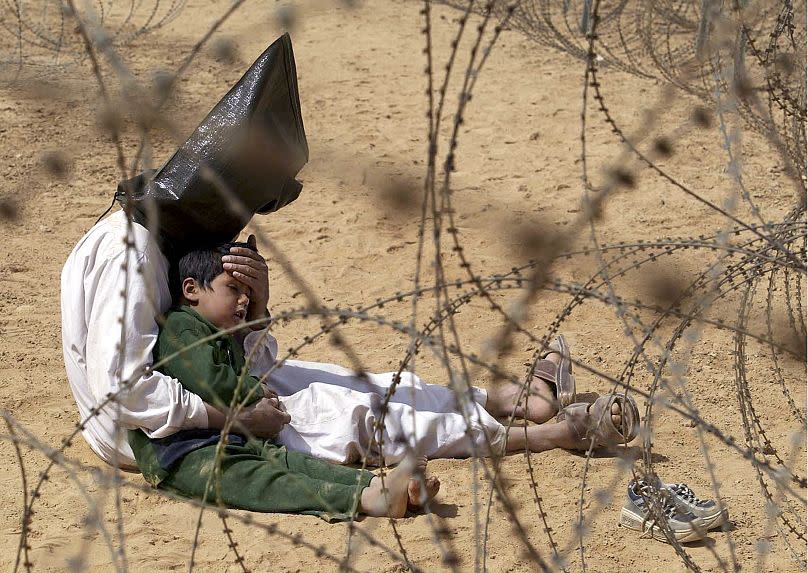'Plunging a country into chaos': What lessons have been learned 20 years after the invasion of Iraq?
“The people of the United States and our friends and allies will not live at the mercy of an outlaw regime that threatens the peace with weapons of mass murder,” announced then-US President George W. Bush from the White House Oval Office on 20 March 2003, as US-led coalition forces began their ground offensive in Iraq.
Their objectives were to destroy Iraq’s weapons of mass destruction (WMD) and bring down the dictatorial rule of Iraq’s President Saddam Hussein.
It took just nine months for US forces to capture Hussein. He was executed three years later for “crimes against humanity.”
But the question of Iraq’s alleged possession of chemical, biological and nuclear weapons became increasingly contentious. The failure of inspectors to locate the alleged WMDs led to mounting scepticism over the legitimacy of claims made by the Bush administration in October 2002.
By the time the last US troops left Iraq in December 2011 - more than nine years after the invasion began - 4,490 American troops, 179 British service personnel, and over 100,000 Iraqi civilians had been killed. No evidence of WMDs with nuclear delivery capabilities was ever found.
In the UK in 2016, Sir John Chilcot released a damning inquiry on Prime Minister Tony Blair’s decision to commit troops to Iraq, in which he concluded that opportunities for peace were missed, the threat posed by Saddam Hussein had been exaggerated, and that intelligence on Iraq’s alleged possession of WMDs was “flawed.”
Twenty years on, what lessons have been learned? Two Iraq War veterans gave us their take on the invasion and its aftermath.
Memories of the invasion
Following a series of airstrikes against "selected targets of military importance", US-led forces began their ground offensive in Iraq, which President Bush described as the start of "a broad and concerted campaign."
“The crucial thing is that it all happened way ahead of our expectation," former British Army Officer, Colonel Tim Collins, told Euronews.
"It was supposed to happen on about the 24th (March). And so we thought we had some days in hand. [...] So it kind of caught us off guard. But it was a good way to start because there wasn't much time to think about it. [...] We quickly were given instructions to get ready to leave our bases and head to dispersal positions. And within 24 hours of that, we were crossing the border.”
“There wasn't a great deal of fighting to start with. [...] And so it was very much a question of taking over the large number of prisoners of war who were coming in and surrendering to us, finding some water, some food for them, and at the same time our job was to secure the gas oil separation plants on the Iraqi southern oil fields.”
"We were under incoming fire on an almost daily basis on some of the deployments I was on [...] I learned a lot about myself and a lot about other people," explained British Army veteran David Hornsby, who served five tours of Iraq as an emergency nurse.
"And I learned a lot about looking after both my troops and the casualties I was assigned to. So I think both professionally and personally, I grew a lot from my experiences."
What were forces told about why they were in Iraq?
At the time of the invasion, the White House had repeatedly stated that the decision to go to war was based upon Saddam Hussein's alleged possession and development of WMDs and his ties to the militant Islamist group, al-Qaeda.

"[What we were told] was very consistent with the information that the general public was being told, and that was very much based around weapons of mass destruction and the intelligence that the Americans and the British both announced prior to the invasion," said David Hornsby.
“There was a great deal of confusion […] and it was very much centred around the snippets to do with weapons of mass destruction," revealed Colonel Tim Collins.
"But it became clear, although it was never tacitly stated, that regime change was the aim. So, there was no real clarity about what the aim was, but there was a continuing threat of weapons of mass destruction," Collins added.
Doubt over WMD claims
In the months and years leading up to the invasion, UN inspectors had been unable to locate Iraqi WMDs.
By 2004, the United Nations Secretary-General Kofi Annan announced that the US-led war in Iraq was illegal, in violation of the UN’s founding charter and had not been sanctioned by the UN Security Council.
“The simple fact is that they were undoubtedly in possession of chemical weapons and nerve agents because they’d used them against the Kurds already. So, we knew that it was a fact," Collins told Euronews.
"And the question mark hanging over whether they had a nuclear capability and, if they had a nuclear capability, did they have a nuclear-delivery capability, of course, that didn't become evident until six months to a year after the invasion. So, at the time, it really wasn't an issue. When we crossed the border initially, we were carrying chemical and biological warfare equipment and wearing protective suits, and then we had respirators with us.”
Problems with the campaign in Iraq
Two months into the invasion, General Tommy R. Franks, the commander of U.S. forces in Iraq, announced the decision to disband the Iraqi army, and abolish Saddam Hussein's Ba'ath Party. Tim Collins told Euronews that this decision proved extremely counterproductive, and revealed shortcomings in the coalition governments.
"By sacking all the members of the Ba’ath Party, it didn't occur to them that you couldn't be a schoolteacher, a policeman, an electricity worker, a water worker or anybody to do with infrastructure or maintenance if you weren't in the Ba’ath Party," explained Colonel Tim Collins.
"So, they pretty much sacked everybody who was able to make Iraq function. At the same time, by disbanding the army, they turned what was a relatively effective, well-disciplined army into an extremely effective insurgency.”

“At the time we were simply doing our jobs and I made the fatal error of supposing that if I got on, did my job as a soldier on the ground, someone in government either in the UK or the US, had some form of plan for what would happen once we had secured Iraq," the former British army officer admitted.
"Now, previous to that, my job before taking command of my battalion, was working in headquarters, Special Forces, and we were certainly conducting information operations against the Iraqi regime. And the main thrust of those operations was to try and secure the support of the Iraqi military for them to remove Saddam Hussein. And the recognition that if his regime fell, [...] it would come to the Iraqi military to provide the security and structure for long enough for civilian elections to be held for a legitimate new Iraqi government to come along. And that was my understanding. So, we all assumed that someone had a plan. We didn't realise there was no plan.”
Lessons learned from the Iraq war
Two decades later, war rages on the European continent, leading many to reflect on what lessons, if any, can be taken from the conflict in Iraq.
According to David Hornsby, the treatment of wounded soldiers in Iraq helped bring about important medical discoveries that will help treat service personnel in future conflicts.
“The conflict in Iraq led to some amazing medical advances in terms of care for traumatic injuries […] So I think there's this scope and I'm sure there are already ongoing discussions between health bodies such as the NHS and Ukraine in order to share lessons learned," Hornsby explained.

Colonel Tim Collins told Euronews that, as far as the war in Ukraine is concerned, the Iraq conflict revealed the importance of dialogue with people who understand the country you're invading.
"My full expectation is that the Russian losses and the reverses they're suffering may well lead to a collapse in the regime in Moscow. If that is the case, then I think we in the West need to be ready to work closely with the remnants of the Russian military to maintain peace and stability within that country until such time as [...] elections can be organised and run, and a democratically-elected government can be put in place," he explained.
"At the same time, we must be ready immediately to provide the wherewithal and the financial support to get normal life going as quickly as possible, which is something we didn't do in Iraq. It's something we didn't do when the Soviet Union collapsed. And I think we need to learn these lessons and be ready to be very generous, very quickly, so that normality can [...] fill the vacuum left behind by the previous regime."

 Yahoo News
Yahoo News 
